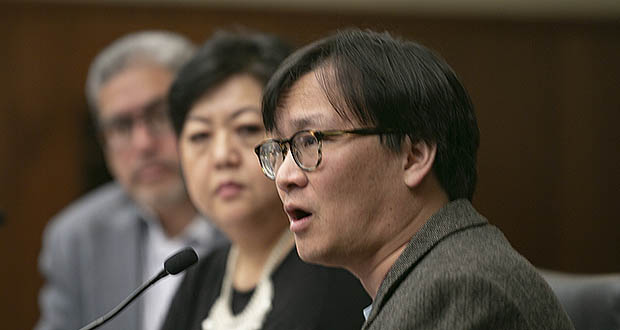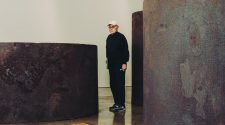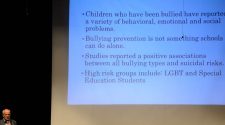Name: Linus Chan
Title: Associate clinical professor of law, University of Minnesota Law School, director of the Detainee Rights Clinic at the school’s Binger Center for New Americans
Education: A.B., University of Chicago; J.D., Northwestern University School of Law
University of Minnesota Law School professor Linus Chan, recently honored for outstanding contributions to immigrant justice, attributes the recognition to his frustration.
That frustration with the legal system led Chan to try new tactics, such as persuading the Minnesota Freedom Fund to pay immigrant as well as criminal bonds.
The National Immigration Project of the National Lawyers Guild named Chan its 2020 Member Honoree in July.
Chan leads the Detainee Rights Clinic at the law school’s Binger Center for New Americans.
It’s the best job, Chan said, because he’s doing work he’s passionate about with autonomy and supportive colleagues. It also involves, however, bearing witness to clients’ “pain and suffering.”
“I get to help this country realize the ideas and values that it says it has but rarely displays in how we treat people who want to be part of our community,” Chan said.
Chan’s defense of a Cambodian Americans facing deportation earned him Minnesota Lawyer Attorney of the Year honors.
Q: What’s the best way to start a conversation with you?
A: I love talking to people to a certain extent. Sometimes people could think I’m an extrovert but a lot of times I like to listen to what people are passionate about.
Q: Why did you study law and pursue it as a career?
A: I wanted to do philosophy. I was interested in the philosophy of law. A philosophy professor told me to go to law school instead. Once I got to law school I realized what an absolute opportunity it is to be a lawyer and to be able to make some changes in the world.
Q: What books are on your bedside table or e-reader?
A: I really like history of science, so I just finished “The Alchemy of Us,” by Ainissa Ramirez, which is stories about inventions such as steel or glass that changed human history.
Q: What do you like best about your work?
A: There’s no other job where I’d get to interact with students and people who are part of my community and learn so much about what the story and arcs of our lives can be and what they can mean for all of us.
Q: What do you least like about it?
A: I dislike having to be so confrontational. I don’t like arguing. I’ll do it because that’s part of my job. But that’s not something I enjoy.
Q: What do you like doing away from work?
A: I like gardening, growing vegetables and perennials. I also have a coral reef tank, a salt-water tank. Those are the things I like to do besides playing with my daughter and being with my family.
Q: If someone visits you in your hometown, what would you take them to see or do?
A: I grew up in Irvine, California, so I would probably take them to Crystal Cove State Beach, which is an amazing beach where you can see tide pools and all that sort of cool stuff.
Q: Is there an attorney or judge, past or present, whom you most admire—and why?
A: There was a piece that was written called “Resistance Lawyering.” These were lawyers fighting during pre-Civil War. They were fighting for the Chinese during the Chinese Exclusion Act and filing habeas petitions. Those lawyers were up against a system that saw no way for change, but they still did it anyway. When I think about some of that work, I think about those folks and lawyers during the civil rights era who were doing that kind of work in the midst of a lot of danger and harm and still thought it was worthwhile.
Q: What’s your favorite depiction of the law or the legal profession in popular culture?
A: “The Practice” was awesome. It wasn’t a great insight into legal doctrine or theory except that it had a large number of legal ethical problems that was pretty fun.
Like this article? Gain access to all of our great content with a month-to-month subscription. Start your subscription.
















